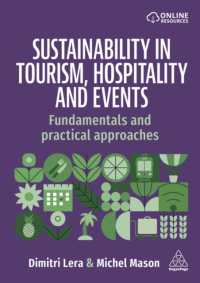- ホーム
- > 洋書
- > 英文書
- > History / World
Full Description
Winner of the 1990 American Book Award
What is classical about Classical civilization? In one of the most audacious works of scholarship ever written, Martin Bernal challenges the foundation of our thinking about this question. Classical civilization, he argues, has deep roots in Afroasiatic cultures. But these Afroasiatic influences have been systematically ignored, denied or suppressed since the eighteenth century—chiefly for racist reasons.
The popular view is that Greek civilization was the result of the conquest of a sophisticated but weak native population by vigorous Indo-European speakers—Aryans—from the North. But the Classical Greeks, Bernal argues, knew nothing of this "Aryan model." They did not see their institutions as original, but as derived from the East and from Egypt in particular.
This long-awaited third and final volume of the series is concerned with the linguistic evidence that contradicts the Aryan Model of ancient Greece. Bernal shows how nearly 40 percent of the Greek vocabulary has been plausibly derived from two Afroasiatic languages - Ancient Egyptian and West Semitic. He also reveals how these derivations are not limited to matters of trade, but extended to the sophisticated language of politics, religion, and philosophy. This evidence, according to Bernal, greatly strengthens the hypothesis that in Greece an Indo-European-speaking population was culturally dominated by Ancient Egyptian and West Semitic speakers.
Provocative, passionate, and colossal in scope, this volume caps a thoughtful rewriting of history that has been stirring academic and political controversy since the publication of the first volume.
Contents
Contents
Preface and Acknowledgments
Transcriptions and Phonetics
Maps and Charts
INTRODUCTION
The previous volumes and their reception
"Classics has been misunderstood"
Anathema from a G.O.M.
Outline of Volume 3
Chapter 1 HISTORICAL LINGUISTICS AND THE IMAGE OF ANCIENT GREEK
Nineteenth-century romantic linguistics:
The tree and the family
Saussure and the twentieth-century epigones
of nineteenth-century Indo-European studies
Ramification or interlacing
Chapter 2 THE "NOSTRATIC" AND "EUROASIATIC" HYPERAND SUPER-FAMILIES
Nostratic and Eurasiatic
Archaeological evidence for the origin of Nostratic and Euroasiatic
Gordon Childe and Colin Renfrew
Language and genetics
Conclusion
Chapter 3 AFROASIATIC, EGYPTIAN AND SEMITIC
The origins of African languages and the development of agriculture in Africa
The origins and spread of Afroasiatic
Conclusion
Chapter 4 THE ORIGINS OF INDO-HITTITE AND INDOEUROPEAN AND THEIR CONTACTS WITH OTHER LANGUAGES
The origins and diffusion of Indo-Hittite and Indo-European
Loans from other languages into PIH
Development of an Indo-European gender system based on sex
Conclusion
Chapter 5 THE GREEK LANGUAGE IN THE MEDITERRANEAN CONTEXT: PART 1, PHONOLOGY
Greek: Result of a linguistic shift or of language contact?
The elements of the Greek linguistic amalgam
The phonologies of Indo-Hittite and Indo-European
Phonological developments from PIE to Greek
Conclusion
Chapter 6 THE GREEK LANGUAGE IN THE MEDITERRANEAN CONTEXT: PART 2, MORPHOLOGICAL AND SYNTACTICAL
DEVELOPMENTS
Morphology
Syntax
Summary on syntactical changes
Conclusion
Chapter 7 THE GREEK LANGUAGE IN THE MEDITERRANEAN CONTEXT: PART 3, LEXICON
Introduction
The study of lexical borrowings
Ancient Greeks' sense of lexical borrowing
Loans from Afroasiatic into Greek and into Albanian or
Armenian
Conclusion
Chapter 8 PHONETIC DEVELOPMENTS IN EGYPTIAN, WEST SEMITIC AND GREEK OVER THE LAST THREE MILLENNIA BCE, AS REFLECTED IN LEXICAL BORROWINGS
Introduction
Semitic
Egyptian
Conclusion
Chapter 9 GREEK BORROWINGS FROM EGYPTIAN PREFIXES, INCLUDING THE DEFINITE ARTICLES
Introduction
Greek Borrowings from Egyptian definite article prefixes
The Egyptian word pr "house, temple, palace"
R- "entry" or local prefix
(R)dˆt, "causal prefix"
Greek borrowings from Egyptian verbs beginning with dˆ(t)-
Conclusion
Chapter 10 MAJOR EGYPTIAN TERMS IN GREEK: PART 1
1. Ntr/KÅ
2. OEnΔ
3. M(w)dw, mu'qo"
4. SbÅ
5. Dr, R-dr, drw
6. ÷Mwr,MÅOEt, Moi'ra, Meivromai and MmÅOEt, Ma
7. Ôpr
Conclusion
Chapter 11 MAJOR EGYPTIAN TERMS IN GREEK: PART 2
nfr (w)/ms
nfr/ms
Conclusion
CONTENTS
Chapter 12 SIXTEEN MINOR ROOTS
Introduction
CONCLUSION
Chapter 13 SEMITIC SIBILANTS
Introduction
Loans of sibilants from Canaanite into Greek
Lateral fricatives
Sheltered /s/ sC /s/ before consonants
Conclusion
Chapter 14 MORE SEMITIC LOANS INTO GREEK
Introduction
Conclusion
Chapter 15 SOME EGYPTIAN AND SEMITIC SEMANTIC CLUSTERS IN GREEK
Nature and agriculture
Cooking
Medicine
Conclusion
Chapter 16 SEMANTIC CLUSTERS: WARFARE, HUNTING AND SHIPPING
Weapons, warfare and hunting
Shipping
Chapter 17 SEMANTIC CLUSTERS: SOCIETY, POLITICS, LAW AND ABSTRACTION
Introduction
Society
Politics
Law and order
Abstraction
Chapter 18 RELIGIOUS TERMINOLOGY
Structures
Personnel
Cult objects
Rituals
Sacrifices
Incense, flowers, scents
Aura
Mysteries
Conclusion
Chapter 19 DIVINE NAMES: GODS, MYTHICAL CREATURES, HEROES
Introduction: Gods
Ôpr, "become" Ôprr, Apollo, Askle\pios, Python and Delphi
Apollo the "Aryan"
Was Apollo a sun god before the fifth century?
Twins, Apollo and Artemis
Other Olympians
Zeus Nsw
Other gods
Herodotos' non-Egyptian divine names
Demigods
Mythical creatures
Some heroes
Conclusion
Chapter 20 GEOGRAPHICAL FEATURES AND PLACE-NAMES
Introduction
Natural features
City names
Conclusion
Chapter 21 SPARTA
Introduction
Sparta: *sper and SpÅt
Anubis, Hermes and Sparta
"Late" borrowings and Lykurgos
Lakonian terminology Egyptian?
Sparta and death
Spartans and Jews
Chapter 22 ATHENA AND ATHENS
Introduction
Summary of the chapter
Armor and equipment
Athena and her victims
Athens as a colony from Sais?
Summary of the cultic evidence
Etymology of names
H˘t ntr (nt) Nt Athe\na(ia)
Conclusion
CONCLUSION
Notes
Glossary
Greek Words and Names with Proposed Afroasiatic Etymologies
Letter Correspondences
Bibliography
Index








